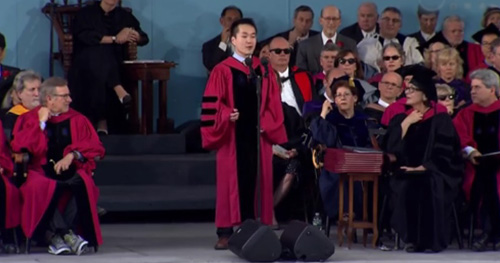
图为哈佛大学毕业典礼现场
蜘蛛咬伤的事故已经过去大概十五年了。我非常高兴的向在座的各位报告一下,我的手还是完好的。但是,我刚刚提到的这个问题这些年来一直停在我的脑海中,而我也时不时会因为先进科技知识在世界上不同地区的不平等分布而困扰。现如今,我们人类已经学会怎么进行人类基因编辑了,也研究清楚了很多个癌症发生发展的原因。我们甚至可以利用一束光来控制我们大脑内神经元的活动。每年生物医学的研究都会给我们带来不一样突破和进步——其中有不少令人振奋,也极具革命颠覆性的成果。
然而,尽管我们人类已经在科研上有了无数的建树,在怎样把这些最前沿的科学研究带到世界最需要该技术的地区这件事情上,我们有时做的差强人意。世界银行的数据显示,世界上大约有12%的人口每天的生活水平仍然低于2美元。营养不良每年导致三百万儿童死亡。将近3亿人口仍然受到疟疾的干扰。在世界各地,我们经常看到类似的由贫穷,疾病和自然匮乏导致的科学知识传播的受阻。现代社会里习以为常的那些救生常识经常在这些欠发达或不发达地区未能普及。于是,在世界上仍有很多地区,人们只能依赖于用火疗这一简单粗暴的方式来治理蜘蛛咬伤事故。
在哈佛读书期间,我有切身体会到先进的科技知识能够既简单又深远的帮助到社会上很多的人。本世纪初的时候,禽流感在亚洲多个国家肆虐。那个时候,村庄里的农民听到禽流感就像听到恶魔施咒一样,对其特别的恐惧。乡村的土医疗方法对这样一个疾病也是束手无策。农民对于普通感冒和流感的区别并不是很清楚,他们并不懂得流感比普通感冒可能更加致命。而且,大部分人对于科学家所发现的流感病毒能够跨不同物种传播这一事实并不清楚。
于是,在我意识到这些知识背景,及简单的将受感染的不同物种隔离开来以减缓疾病传播,并决定将这些知识传递到我的村庄时,我的心里第一次有了一种作为未来科学家的使命感。但这种使命感不只停在知识层面,它也是我个人道德发展的重要转折点,我自我理解的作为国际社会一员的责任感。
哈佛的教育教会我们学生敢于拥有自己的梦想,勇于立志改变世界。在毕业典礼这样一个特别的日子,我们在座的毕业生都会畅想我们未来的伟大征程和冒险。对我而言,我在此刻不可避免的还会想到我的家乡。我成长的经历教会了我作为一个科学家,积极的将我们所会的知识传递给那些急需这些知识的人是多么的重要。因为利用那些我们已经拥有的科技知识,我们能够轻而易举的帮助我的家乡,还有千千万万类似的村庄,让他们生活的世界变成一个我们现代社会看起来习以为常的场所,而这样一件事,是我们每一个毕业生都能够做的,也力所能及能够做到的。
但问题是,我们愿意来做这样的努力吗?
比以往任何时候都多,我们的社会强调科学和创新。但我们社会同样需要注意的一个重心是分配知识到那些真正需要的地方。改变世界并不意味着每个人都要做一个大突破。改变世界可以非常简单。它可以简单得变成作为世界不同地区的沟通者,并找出更多创造性的方法将知识传递给像我母亲或农民这样的群体。同时,改变世界也意味着我们的社会,作为一个整体,能够更清醒的认识到科技知识的更加均衡的分布,是人类社会发展的一个关键环节,而我们也能够一起奋斗将此目标变成现实。
如果我们能够做到这些,或许,将来有一天,一个在农村被毒蜘蛛咬伤的少年或许不用火疗这样粗暴的方法来治疗伤口,而是去看医生得到更为先进的医疗护理。
小预告:上周搜狐教育独家专访了何江。何江分享了自己在异国他乡的学习和生活经历,特别是刚到哈佛大学遇到的人文环境 和学习环境差异带来的挑战。虽然在乡下的成长经历让自己跟在城市孩子在视野见识上存在差距,但他离自己的梦想越来越近。回首这个过程,有哪些不为人知的故 事?对于未来,他又有什么不一样的打算?敬请期待搜狐教育独家后续报道!

搜狐教育在美国专访何江(右)。(图片来源:搜狐教育)
附:何江演讲英文版
The Spider’s Bite
When I was in middle school, a poisonous spider bit my right hand. I ran to my mom for help—but instead of taking me to a doctor, my mom set my hand on fire.
After wrapping my hand withseveral layers of cotton, then soaking it in wine, she put a chopstick into my mouth,and ignited the cotton. Heat quickly penetrated the cotton and began to roast my hand. The searing pain made me want to scream, but the chopstick prevented it. All I could do was watch my hand burn - one minute, then two minutes –until mom put out the fire.
You see, the part of China I grew up in was a rural village, and at that time pre-industrial. When I was born, my village had no cars, no telephones, no electricity, not even running water. And we certainly didn’t have access to modern medical resources. There was no doctor my mother could bring me to see about my spider bite.
For those who study biology, you may have grasped the science behind my mom’s cure: heat deactivates proteins, and a spider’s venom is simply a form of protein. It’s coolhow that folk remedy actually incorporates basic biochemistry, isn’t it? But I am a PhD student in biochemistry at Harvard, I now know that better, less painful and less risky treatments existed. So I can’t help but ask myself, why I didn’t receive oneat the time?
Fifteen years have passed since that incident. I am happy to report that my hand is fine. But this question lingers, and I continue to be troubled by the unequal distribution of scientific knowledge throughout the world. We have learned to edit the human genome and unlock many secrets of how cancer progresses. We can manipulate neuronal activity literally with the switch of a light. Each year brings more advances in biomedical research-exciting, transformative accomplishments. Yet, despite the knowledge we have amassed, we haven’t been so successful in deploying it to where it’s needed most. According to the World Bank, twelve percent of the world’s population lives on less than $2 a day. Malnutrition kills more than 3 million children annually. Three hundred million peopleare afflicted by malaria globally. All over the world, we constantly see these problems of poverty, illness, and lack of resources impeding the flow of scientific information. Lifesaving knowledge we take for granted in the modern world is often unavailable in these underdeveloped regions.And in far too many places, people are still essentially trying to cure a spider bite with fire.
While studying at Harvard, I saw how scientific knowledge can help others in simple, yet profound ways. The bird flu pandemic in the 2000s looked to my village like a spell cast by demons. Our folk medicine didn’t even have half-measures to offer. What’s more, farmers didn’t know the difference between common cold and flu; they didn’t understand that the flu was much more lethal than the common cold. Most people were also unaware that the virus could transmit across different species.
So when I realized that simple hygiene practices like separating different animal species could contain the spread of the disease, and that I could help make this knowledge available to my village, that was my first “Aha” moment as a budding scientist. But it was more than that: it was also a vital inflection point in my own ethical development, my own self-understanding as a member of the global community.
Harvard dares us to dream big, to aspire to change the world. Here on this Commencement Day, we are probably thinking of grand destinations and big adventures that await us. As for me, I am also thinking of the farmers in my village. My experiencehere reminds me how important it is for researchersto communicateour knowledge to those who need it. Because by using the sciencewe already have, we could probably bring my village and thousands like it into the world you and I take for granted every day. And that’s an impact every one of us can make!
But the question is, will we make the effort or not?
More than ever before,our society emphasizes science and innovation. But an equally important emphasis should be on distributing the knowledge we have to where it’s needed. Changing the world doesn’t mean thateveryone has to find the next big thing. It can be as simple as becoming better communicators, and finding more creative ways to pass on the knowledge we have to people like my mom and the farmers in their local community. Our society also needs to recognize that the equal distribution of knowledge is a pivotal step of human development, and work to bring this into reality.
And if we do that, then perhaps a teenager in rural China who is bitten by a spider will not have to burn his hand, but will know to seek a doctor instead.
加拿大华人网 http://www.sinoca.com/